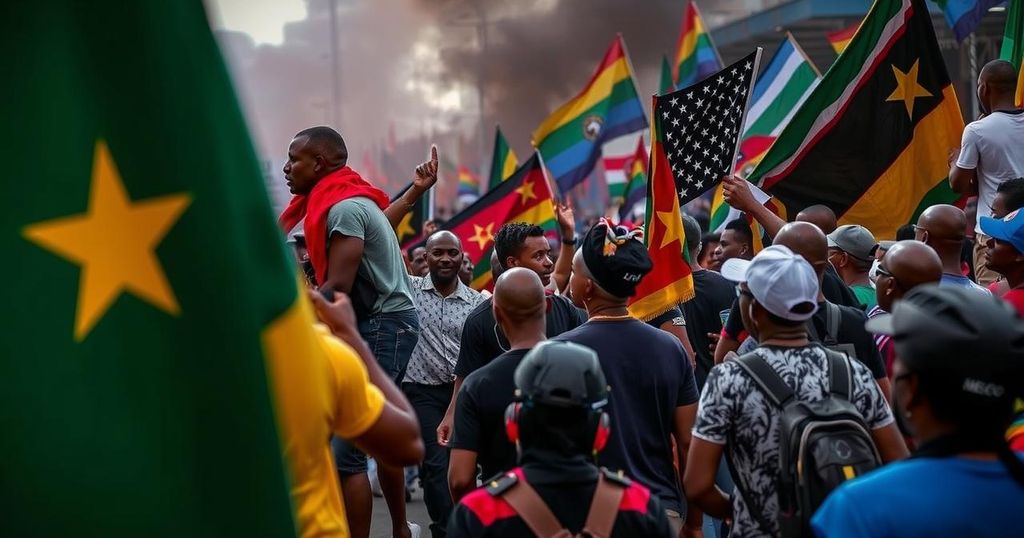World news
2024 ELECTIONS, AFRICA, ANGELA UAELA, CARMELITA CHISSICO, EL, ELECTIONS, EU, FR, FRELIMO, HUMAN RIGHTS WATCH, MAPUTO, MOZAMBIQUE, OFFICIAL ELECTION COMMISSION, PODEMOS, POLITICAL VIOLENCE, PROTESTS, RIGHTS WATCH, SILVIO JEREMIAS, VENÂNCIO MONDLANE, VIOLENCE, VOTER TURNOUT
Oliver Grayson
0 Comments
Death Toll Climbs as Mozambique Protests Intensify Over Election Disputes
A wave of protests erupted in Mozambique following the announcement of the election results, where Frelimo party’s Daniel Chapo emerged the victor amid accusations of vote rigging. Tragically, police actions during these protests resulted in the deaths of at least 11 individuals, including Silvio Jeremias. The opposition party, Podemos, claims a significant electoral win and challenges the results legally. Human rights activists have raised alarms over the increasing violence against opposition members, underscoring a growing discontent among the younger population seeking change.
In the wake of the electoral process held on October 25 in Mozambique, protesters have expressed outrage over the election results, leading to significant civil unrest. The ruling Frelimo party’s candidate, Daniel Chapo, was declared the winner with 70.7% of the votes, which has incited allegations of vote rigging and manipulation. Amidst the protests, Silvio Jeremias, a young father on his way home from work, was tragically shot and killed by police forces. His death is part of a broader pattern of violence, with reports indicating at least 11 fatalities and numerous injuries as demonstrators took to the streets across the nation. Human Rights Watch documented that 50 individuals sustained serious injuries from gunfire during the protests, while police claimed they had only discharged weapons to disperse crowds. Questions arise regarding the legitimacy of the elections, as Frelimo has maintained power since Mozambique’s independence in 1975, and there is growing dissatisfaction among the youth—a demographic with an average age below 18—who feel increasingly disenfranchised by the ruling party. The opposition party, Podemos, led by Venâncio Mondlane, asserts that it received 53% of the vote and has issued a comprehensive legal challenge to the election results, presenting extensive documentation to support their case. These allegations have been compounded by previous incidents of violence against opposition members, highlighted by the recent assassinations of attorney Elvino Dias and filmmaker Paulo Guambe. Such acts have raised concerns among human rights advocates regarding the safety and rights of political activists and journalists in the country. The aftermath of these events has spurred strong emotional responses from the community, as demonstrated during Jeremias’ memorial, where attendees donned shirts featuring his image and voiced calls for justice and greater democratic freedoms. This situation encapsulates a critical juncture in Mozambique’s socio-political landscape, reflecting a populace yearning for change amid a backdrop of escalating violence and disillusionment with the ruling establishment.
The political climate in Mozambique has become increasingly tense following the recent elections, where the Frelimo party was accused of manipulating the voting process. With the party having held power since 1975, frustration is mounting among voters, especially the younger demographic who feel unrepresented. The protests following the election results starkly illustrate public discontent with the ruling government, particularly allegations of voter suppression and corruption that have marred the electoral process. Furthermore, instances of violence against opposition voices signal a disturbing trend of intimidation and repression in the pursuit of political power.
The circumstances surrounding the recent protests in Mozambique highlight a significant crisis in governance and civil rights. With a growing number of casualties attributed to police violence during demonstrations, the calls for justice, transparency, and democratic reform are louder than ever. The situation is exacerbated by prior incidents of violence against opposition figures, indicating a pattern of suppression that threatens the very fabric of democracy in Mozambique. As the Frelimo party continues to face mounting allegations of electoral misconduct, the demands for accountability and political reform resonate deeply among the populace, marking a crucial moment in the nation’s history.
Original Source: www.theguardian.com




Post Comment